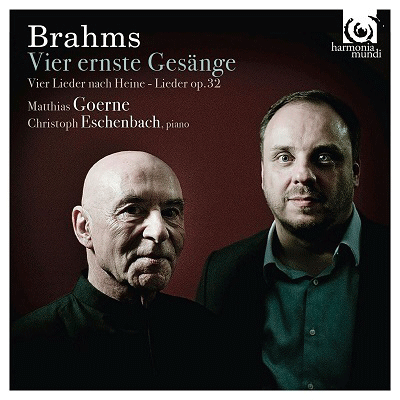Matthias Goerne and Christoph Eschenbach , Brahms Vier ernste Gesänge and other Lieder, from Harmonia Mundi, is an extremely welcome release, since Goerne has.been singing these songs in recital for 20 years, so distinctively that they have become his emblem, so to speak. Now, at last a performance has been preserved for posterity. "Brahms free of the thick veneer of varnish", I wrote about Goerne's first Vier ernste Gesänge at the Wigmore Hall nearly two decades ago. This recording is even better, enhanced by vocal maturity and psychological truth.
When he wrote these last songs, Brahms was facing death but looking back on the North German tradition that he had left behind decades before, but also by extension to the defiant spirit of the Reformation. Like Ein deutsches Requiem, that in itself, in pious, obedient Catholic Austria, suggests rugged independence of spirit. There is no heavenly afterlife in Vier ernste Gesänge. These aren't last songs, either, but specifically "serious". Thus the significance of the piano part in Vier ernste Gesänge : two performers alone against the world. Brahms and Clara Schumann, perhaps, both pianists looking back and fearlessly ahead. Christoph Eschenbach and Goerne are an ideal partnership. They've worked together for years and both approach the work with uncompromising emotional directness.
Eschenbach's introduction is firm, and resolute. "Den es gehet dem Menschen wie dem Vieh, wie dies stirbt, so stirbt er auch". Eschenbach shapes the lines around "Es fährt alles am einen Ort", so they fly turbulently upwards, as if propelled by wind: for we are dust, returning to dust. No Biedermeier sentimentality, but quiet dignity. A strident chord cuts the song off abruptly. You don't mess with Death. Then a softer, more reflective mood. "Ich wandte mich und sah an alle", reflecting on suffering and the bitterness of life. Goerne sings with such compassion that his voice conveys both sympathy and protest. For what is the human condition if the dead are better off than those yet to experience the evils of the world? "O Tod, o Tod, wie bitter bitter, wie bitter bist du" sings Goerne, as if he were addressing Death man to man, each "wie bitter" beautiful shaped, like a genuine, personal rebuke. Eschenbach plays the transition firmly, but sensitively, emphasizing the growing resolve in Goerne';s voice. This is a transit. "O Tod, o Tod " sings Goerne, breathing warmth into the "wie wohl" which follows. "Wie wohl tust du".
Thus the affirmative resolution of the last song and its vigorous mood. The gifts of many tongues, of prophecy and even of faith, are nothing without love. Then the glorious line "Wir sehen jetzt durch einen Speigel", when Goerne's voice rises, extraordinarily clearly and bright for a baritone happiest in the lower range, as if lit from within with inner strength. Eschenbach's piano sings along. "Nun aber bleibet Glaube, Hoffnung, Liebe, diese drei: aber ist die Liebe ist die größte unter ihnen" Not the glories of the world, nor status, but love, to which all can aspire. Goerne's non-strident, purposeful expressiveness is, like love, both simple and extremely perceptive. Hugo Wolf, who eked a subsistence from music journalism, detested Brahms. "The true test of a composer", he wrote, "is this : Can he exult? Wagner can exult, Brahms cannot". What a pity Wolf hadn't heard Goerne and Eschenbach, who demonstrate that pietist purity is a form of exultation, and that Brahms can exult very well, without shouting.
These Vier ernste Gesänge will make this recording a must, but so too will the superb performances of Brahms' nine Lieder und Gesänge op 32 (1864) to texts by Karl August Graf von Platen and Georg Freidrich Daumer, poets with whom Brahms had great affinity, Excellent booklet notes, by Roman Hinke, which explain how the Platen and Daumer songs "mark nothing less than the entry into a new, surprisingly cryptic and conflict-ridden world ....what might have led Brahms to turn to Platen's poetic existentialism, to take his dark fantasies of the other side as the starting point of a disturbing sequence of songs". In "Wie rafft' ich mich auf", the poet leaps up in the middle of the night, wandering through the silent city. The lines "in die Nacht" repeat, obsessively, The stars look down, accusingly : "how have you spent your life?" they seem to ask.
The following six songs reiterate this question. Brahms chose his texts well and his settings give further coherence to the set. A river flows past, swiftly, love ends. From trauma to tenderness: the three Daumer songs are gentler, closer to cosy, popular misconceptions of Brahms. Lovely piano melodies, but the last song Wie bist du, meine Königen reaches an altogether more refined level of sophistication. Goerne sings the refrain "Wonnevoll, wonnervoll" (blissful, blissful) with such grace that it feels like a moment of rapture, pulling the whole group of songs together as an integrated cycle. Again, Goerne and Eschenbach prove that Brahms exults!
Heinrich Heine, with his acidic irony, might not seem natural Brahms territory, but the Lieder nach Gedicten von Heinrich Heine op 85 (1878) are lovely. Sommerabend and Mondenschein make an exquisite pair. Not many concert pianists (or conductors) have the ability to accompany song with the sensitive support a singer needs. With Eschenbach, the goal is music, not showmanship, art, not ego. Goerne can therefore sing with pointed understatement, knowing that he and Eschenbach are on the same page, literally. The Heine set ends with Meerfahrt, in which the lovers drift in a little boat, past a ghostly island, from which sweet music resounds. They float past "Trostlos auf weitem Meer". Are they lost, or have they escaped what might be hidden in the mists? Brahms isn't letting on, but we don't mind as we drift on, to the sound of oars and waves.
Anne Ozorio
